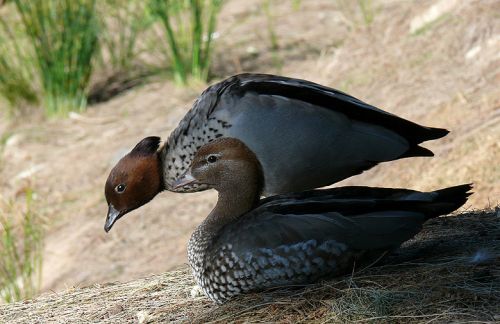(→Behaviour: Added sections) |
m (→External Links: 1 added to GSearch Checked template) |
||
| (5 intermediate revisions by 3 users not shown) | |||
| Line 1: | Line 1: | ||
| − | + | [[Image:AussiWoodDuck.jpg|thumb|500px|right|Photo © by {{user|Rose+Fletcher|Rose Fletcher}} <br />Adelaide, [[South Australia]], 17 September 2008]] | |
| − | [[Image:AussiWoodDuck.jpg|thumb| | + | '''Alternative Names: Australian Wood Duck, Maned Goose''' |
;[[:Category:Chenonetta|Chenonetta]] jubata | ;[[:Category:Chenonetta|Chenonetta]] jubata | ||
| − | |||
==Identification== | ==Identification== | ||
| + | [[Image:Australian Wood Duck4.JPG|thumb|350px|right|Photo © by {{user|Ken+Doy|Ken Doy}}<br />Eagleby, [[Queensland]], [[Australia]], 24 July 2016]] | ||
44–56 cm (17½-22 in) | 44–56 cm (17½-22 in) | ||
*Grey overall plumage | *Grey overall plumage | ||
| Line 11: | Line 11: | ||
*White [[Topography#Wings|speculum]] | *White [[Topography#Wings|speculum]] | ||
<br /> | <br /> | ||
| − | |||
'''Male''' | '''Male''' | ||
*Black "mane" at the back of the head (not always erect)<br /> | *Black "mane" at the back of the head (not always erect)<br /> | ||
| Line 40: | Line 39: | ||
==External Links== | ==External Links== | ||
| − | {{GSearch|Chenonetta | + | {{GSearch|"Chenonetta jubata" {{!}} "Maned Duck" {{!}} "Australian Wood Duck" {{!}} "Maned Goose"}} |
| + | <br /> | ||
| + | {{VSearch|"Chenonetta jubata" {{!}} "Maned Duck" {{!}} "Australian Wood Duck" {{!}} "Maned Goose"}} | ||
| + | {{GS-checked}}1 | ||
| + | <br /> | ||
<br /> | <br /> | ||
| − | |||
| − | |||
| − | |||
| − | [[Category:Birds]] [[Category:Chenonetta | + | [[Category:Birds]] [[Category:Chenonetta]] |
Latest revision as of 23:45, 4 January 2024
Alternative Names: Australian Wood Duck, Maned Goose
- Chenonetta jubata
Identification
44–56 cm (17½-22 in)
Male
- Black "mane" at the back of the head (not always erect)
Female: white stripes above and below the eye and mottled underparts
Distribution
Australia (except driest regions); visitor to Tasmania.
Taxonomy
This is a monotypic species[1].
Habitat
Lightly wooded swamps and marshes.
Behaviour
Breeding
They nest in a tree hole. The clutch consists of 8-12 eggs.
Diet
They feed mostly by grazing, but also dabble and up-ends in shallow water, feeding on aquatic plants.
Vocalisation
Male gives long, drawn-out mewing call that is both mournful and distinctive, and the female gives a similar vocalization to encourage her partner to mate. Flocks chatter when feeding.
Movements
Mostly sedentary.
References
- Clements, J. F., T. S. Schulenberg, M. J. Iliff, S. M. Billerman, T. A. Fredericks, B. L. Sullivan, and C. L. Wood. 2019. The eBird/Clements Checklist of Birds of the World: v2019. Downloaded from http://www.birds.cornell.edu/clementschecklist/download/
- Carboneras, C. & Kirwan, G.M. (2019). Maned Duck (Chenonetta jubata). In: del Hoyo, J., Elliott, A., Sargatal, J., Christie, D.A. & de Juana, E. (eds.). Handbook of the Birds of the World Alive. Lynx Edicions, Barcelona. (retrieved from https://www.hbw.com/node/52856 on 28 December 2019).
- Frost, P.G.H. 2013 [updated 2017]. Australian wood duck. In Miskelly, C.M. (ed.) New Zealand Birds Online. www.nzbirdsonline.org.nz
- Marchant, S.J.; Higgins, P. (eds) 1990. Handbook of Australian, New Zealand and Antarctic birds. Vol. 1, ratites to ducks. Oxford University Press, Melbourne, Australia.
Recommended Citation
- BirdForum Opus contributors. (2025) Maned Duck. In: BirdForum, the forum for wild birds and birding. Retrieved 2 January 2025 from https://www.birdforum.net/opus/Maned_Duck
External Links
GSearch checked for 2020 platform.1





